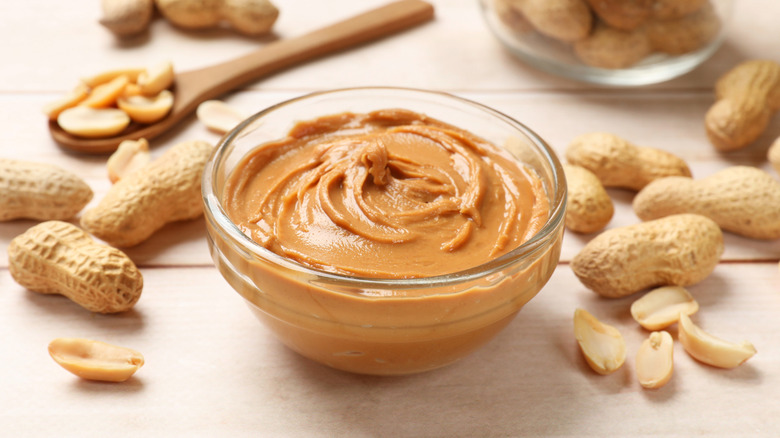This Peanut Butter Skin Health 'Fact' Is Actually A Total Myth
We may receive a commission on purchases made from links.
Believe it or not, there are so many peanut butter-related myths that may have slithered their way into your life. But we're here to tell you that some of your fears regarding this delicious spread are not only false, but they're keeping you from enjoying great foods out of fear. One of these myths, seemingly rising in popularity alongside recent booms in skincare innovation, is the claim that peanut butter causes acne.
There is currently no scientific evidence pointing to a direct correlation between peanut butter and acne. Facial acne develops when oil and dead skin cells obstruct the hair follicles on your face. However, certain things (like the food you eat) can affect hormone levels, leading to excessive oil production and an increase of acne. This is why your diet can technically affect the amount of acne you have, as everyone will have a completely unique reaction to spikes in particular hormones.
Everyone's unique reaction to peanut butter
Even though there is no evidence of peanut butter spiking acne levels, this doesn't mean that it never happens. Unfortunately, every body has an individual response to particular food products. Peanut butter in particular has omega-6 fatty acid compounds in its makeup, which can sometimes cause inflammation for certain people. This inflammation could leave a bad taste in consumers' mouths regarding their body's reaction to peanut butter, which could make the "peanut butter causes acne" claim even more believable. The average container of Jif's Creamy Peanut Butter has 3 grams of sugar per serving, and consuming a lot of sugar can cause your blood sugar to rise. A spike in blood sugar is another factor that can lead to sebum production and an increased amount of acne.
For those struggling with acne, the peanut butter spread on your toast every morning does not have to be your enemy. You don't have to rub banana peels on your face or consume copious amounts of licorice either. In fact, there are so many factors that affect acne, the best way to avoid further issues is to visit a dermatologist.

